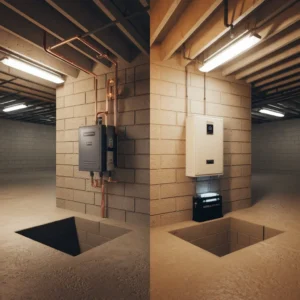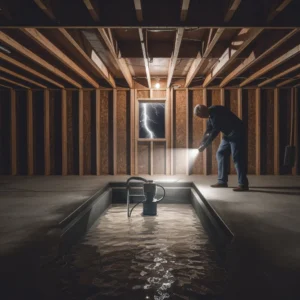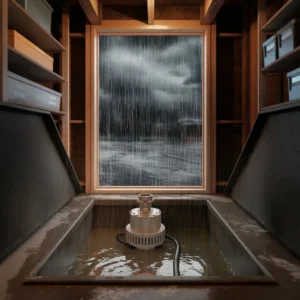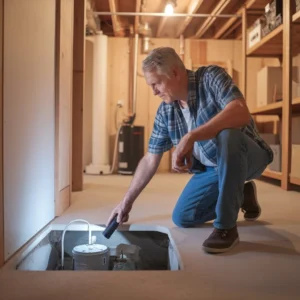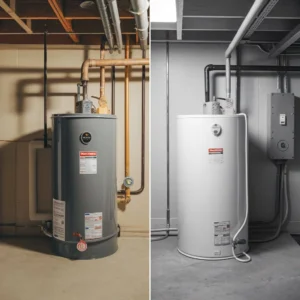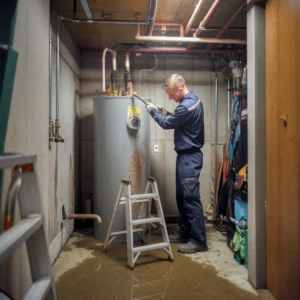Drains should be cleaned weekly with hot water to flush minor debris and monthly using a non-corrosive cleaner for thorough maintenance. Quarterly inspections and cleaning of drain traps guarantee efficient drainage. Professional cable cleaning is advised annually for persistent issues. Regular cleaning prevents clogs, odors, and costly repairs, maintaining peak drain performance. Proper methods include avoiding disposing of grease and employing hot water or baking soda. Discover more insights about preventing and managing drain blockages.
Key Takeaways
- Clean drains weekly by running hot water to flush minor debris and maintain flow.
- Use a non-corrosive drain cleaner monthly for thorough maintenance and to prevent blockages.
- Inspect and clean drain traps and catch basins quarterly to avoid buildup.
- Schedule professional cleaning annually for persistent issues and optimal drain performance.
- Prevent clogs by avoiding disposal of grease, hair, and large food particles down the drains.
What Are the Signs That Your Drains Need Cleaning?
Indicators that drains require cleaning include slow water drainage, which suggests partial blockages impeding flow.
Unpleasant or foul odors emanating from the drains may signal the accumulation of debris or bacteria, necessitating immediate attention.
Additionally, gurgling or strange noises can indicate trapped air caused by obstructions, while specific smells, such as sulfuric or rotten egg-like odors, often point to underlying drainage issues.

Is the Water Draining Slowly?
How can one determine if their drains require cleaning? A primary indicator is slow draining. This suggests potential drain clogs, which impede water flow. Consistent drain maintenance is crucial to maintaining your drains. Various cleaning methods, including using baking soda and vinegar, can effectively clean your drains. For persistent issues, professional drain cleaning may be necessary to guarantee ideal flow in your home’s drains.
| Problem | Emotional Impact | Solution |
|---|---|---|
| Slow Draining | Frustration | Regular cleaning |
| Drain Clogs | Anxiety | Baking soda & vinegar |
| Water Backflow | Distress | Professional cleaning |
| High Water Bill | Financial Strain | Timely maintenance |
| Overflowing | Panic | Immediate intervention |
Regularly addressing these signs helps maintain efficient drainage systems.
Are There Unpleasant or Foul Odors Coming from Your Drains?
Why do unpleasant or foul odors emanate from drains? The primary cause of these odors is the buildup of organic debris in sink drains, leading to bacterial decomposition. This process emits gases with foul odors.
Inadequate drain cleaning and maintenance exacerbate this issue, allowing food particles, grease, and soap scum to accumulate, particularly in kitchen sink drains. Additionally, sewer gases can escape due to dry or malfunctioning traps, contributing to the unpleasant smell.
Regular drain maintenance is essential for preventing such issues. Implementing a routine drain cleaning schedule helps remove debris and prevent bacterial growth. Addressing these odors promptly reduces the risk of plumbing problems and enhances indoor air quality.
Identifying odor sources allows for targeted, effective drain cleaning solutions.
Do You Hear Gurgling or Strange Noises from Your Drains?
In addition to unpleasant odors, auditory signals such as gurgling or strange noises from drains can indicate underlying issues necessitating attention. These sounds often suggest a clogged drain or air trapped within drain pipes.
Addressing these issues promptly is vital to prevent more severe plumbing problems. Regular drain maintenance is essential, particularly for bathroom drains, kitchen sink drains, and shower drains.
Consider these indicators for potential drain cleaning:
- Persistent Gurgling: Continual noises imply blockage within the pipes, requiring immediate attention.
- Strange Noises During Use: Odd sounds while water flows denote possible obstructions.
- Slow Drainage: Coupled with noises, slow drainage is a clear sign of clogging.
Professionally cleaned drains by a drain cleaning service can effectively resolve these issues, ensuring peak function and preventing future complications.
What smells indicate drain problems?
Have you ever noticed an unpleasant odor emanating from the drains? This could be a sign of drain problems requiring immediate attention. Common smells include a rotten egg scent indicative of septic issues or decomposing food particles stuck in the garbage disposal. Effective drain maintenance involves regular cleaning to prevent these odors. Utilizing cleaning chemicals or a drain cleaner can be a temporary solution, but persistent issues often necessitate a professional drain cleaning service.
| Smell Type | Possible Cause | Recommended Action |
|---|---|---|
| Rotten Egg | Septic gas | Inspect septic system |
| Rotting Food | Stuck food particles | Clean garbage disposal |
| Chemical Odor | Excess cleaning chemicals | Use natural drain cleaning methods |
Maintaining clean drains is essential for a hygienic environment and to prevent costly repairs.
How Often do you need Clean Your Drains?
Routine drain maintenance is essential, with most experts recommending a cleaning schedule of every one to three months to prevent buildup and blockages.
Professional drain cleaning should be considered annually, or whenever persistent issues arise, that cannot be resolved with standard cleaning methods.
For ideal drain performance and longevity, it is advisable to consult a professional to assess the specific needs of the plumbing system.
How to Maintain Your Drains: Recommended Cleaning Schedule
How frequently should drains be cleaned to maintain ideal functionality? Regular maintenance is vital for preventing blockages and guaranteeing smooth operation.
It is advised to clean your drains regularly, adopting both drains weekly and monthly routines. Here’s a structured schedule for best results:
- Weekly Tasks: Light cleaning, such as running hot water through the drains in your house to flush out minor debris. This helps maintain clean lines and keep your drains clean.
- Monthly Tasks: Use a non-corrosive drain cleaner to dissolve build-up. This step is necessary for more thorough drain maintenance on a regular basis.
- Quarterly Tasks: Inspect and clean drain traps and catch basins to confirm no larger obstructions exist, reducing the need for professional drain cleaning.
When Should You Call for Professional Drain Cleaning Methods?
Why should one consider calling a professional for drain cleaning? When typical methods fail to maintain drains effectively, the need for professional drain cleaning becomes apparent.
Persistent clogs, slow drainage, or foul odors signal a need for a drain cleaning service. Professionals utilize advanced tools beyond basic drain cleaning chemicals to guarantee pipes are thoroughly cleared.
Getting your drains cleaned professionally not only resolves current issues but also helps keep your drains functioning at peak performance. Routine intervention by experts can prevent future blockages, contributing to maintaining drains over the long term.
Additionally, professional drain cleaning can identify underlying plumbing issues that homeowners might overlook. Therefore, recognizing when to call for professional drain cleaning is essential for sustaining a robust drainage system.
How Often Should Be Drains Professionally Cleaned?
Determining the frequency of professional drain cleaning depends on various factors, such as the age of the plumbing system, the type of usage, and the presence of any existing issues.
Regularly having drains professionally cleaned guarantees longevity and efficiency. Homeowners should consider the following:
- Age of Plumbing: Older systems may require more frequent cleaning to prevent blockages in the drain line and to guarantee proper care for your drains.
- Usage Level: High-usage households should schedule cleanings on a regular basis, possibly annually, to flush the drain and prevent buildup.
- Signs of Issues: If slow drainage persists despite using a cleaning product or chemical cleaner, professional intervention is recommended.
Maintaining a clean and care routine for the drain in your home is essential for peak performance.

Why You Need to Clean Your Drains Regularly: Ways to Clean Your Drains
Regular drain cleaning is essential to prevent the accumulation of debris that can lead to blockages and subsequent plumbing issues.
Without routine maintenance, drains can become clogged, causing water to back up, which can result in costly repairs and potential water damage.
What Happens If You Don’t Clean Drains?
Neglecting regular drain cleaning can lead to significant and costly issues within a plumbing system.
Failure to clean the drains regularly can cause blockages that result in water backing up in one drain, often affecting the drains in the bathroom such as the sink or tub. This occurs when debris accumulates, obstructing the flow. To keep drains clean and functional, periodic maintenance is essential.
- Clogged Drains: Accumulation of hair, soap, and other residues can severely restrict water flow.
- Unpleasant Odors: Organic material decay within the pipes can emit foul smells throughout the household.
- Water Damage: Persistent blockages can cause overflows, leading to water damage and costly repairs.
Introducing hot water into the drain, along with baking soda and vinegar, can mitigate these issues by breaking down deposits effectively.
How Can Regular Cleaning Prevent Drain Problems?
Proper maintenance of drains can greatly reduce the likelihood of plumbing issues, ensuring the system functions efficiently.
Regular cleaning is essential to keep your drains in ideal condition. One might ask, how often should i clean your drains? Implementing a weekly and monthly cleaning routine can prevent buildup.
To clean my drains effectively, start by running the garbage disposal to clear debris. Then, introduce a half cup of baking soda followed by a cup of vinegar. Allow this solution to sit before pouring boiling water into the drain, which helps to get your drains flowing freely.
This method not only dissolves minor clogs but also prevents foul odors, and clearly explains how to clean drains regularly for long-term drain health.
How Can You Prevent Future Drain Blockages?
To prevent future drain blockages, individuals can adopt specific daily habits such as avoiding disposing of grease, hair, and large food particles down the drain.
Routine inspections by a plumbing professional can identify early warning signs of potential blockages, reducing the likelihood of emergencies.
Implementing these simple practices can greatly enhance the longevity and functionality of drainage systems.
What everyday habits help keep drains clear?
Regular maintenance can greatly reduce the likelihood of drain blockages. Implementing everyday habits is essential for maintaining bathroom and drains in your kitchen . A practical approach includes:
- Regular Cleaning: Use a cup of baking soda followed by hot water as a natural solution you can use to clean your drains. This cleaner helps dissolve buildup and deodorizes effectively.
- Rinsing Drains: After each use, rinse drains with hot water to keep drains clear of debris. This prevents particles from accumulating and reaching down into the drain.
- Preventive Habits: Avoid disposing of grease, hair, and large food particles in the sink. These materials are common culprits in blockages and should be disposed of in the trash instead.
Adopting these practices can minimize the risk of clogs and guarantee efficient drainage.
Can regular inspections help avoid emergencies?
While routine maintenance plays an essential role in drain upkeep, conducting regular inspections further aids in preventing unexpected emergencies.
Regular inspections are vital in identifying potential blockages in the sink drain, enabling timely intervention. To effectively avoid emergencies, homeowners should inspect drains on a regular basis, ideally every few months.
During inspections, look for any signs of slow drainage or unusual odors, as these may indicate developing problems. Even if your drains seem clear, regular checks can uncover hidden issues.
Implementing ways to clean your drains, such as using biological cleaners or hot water flushes, will help you keep drains clean. Addressing potential issues across each area of the home guarantees that you can clean your sink drains efficiently and prevent future blockages.
When Is It Time to Consider Professional Drain Cleaning?
Persistent clogging, slow drainage, and unpleasant odors are key indicators that a professional drain cleaning service may be necessary.
Professional services often use advanced equipment such as hydro-jetting and video inspections to efficiently address and identify underlying issues that standard DIY methods cannot resolve.
What are the signs that you need professional drain cleaning service?
Knowing when to enlist a professional drain cleaning service can prevent extensive damage and costly repairs.
Signs indicating the need for drain cleaningservice include:
- Slow Drainage and Frequent Clogs: When slow drainage persists despite home remedies and clogs occur frequently, it may signal a deeper issue requiring expert attention.
- Bad Odors and Gurgling Sounds: Persistent bad odors emanating from drains, accompanied by gurgling sounds, suggest trapped debris that only professional cleaning can effectively resolve.
- Water Backup and Multiple Drains Affected: If water backup occurs or multiple drains are simultaneously affected, it indicates a systemic problem beyond simple DIY solutions, necessitating a plumber inspection.
Ignoring these signs can lead to exacerbated issues, emphasizing the importance of timely intervention by a qualified professional to restore efficient drain function.
What to Expect from a Professional Drain Cleaner?
Professional drain cleaning offers a thorough approach to resolving drainage issues that home remedies cannot effectively address. A plumbing professional conducts a detailed plumbing inspection to assess the drain condition. This assessment helps determine the appropriate cleaning methods and establish a cleaning schedule tailored to the specific needs of the system.
Professional services employ advanced tools and techniques, such as hydro-jetting and motorized drain snakes, guaranteeing extensive drain maintenance and effective drain clog prevention.
The frequency of cleaning depends on factors like usage patterns and initial drain condition assessment. Regular professional drain cleaning not only prevents future blockages but also extends the lifespan of the plumbing system.

Conclusion
Regular drain maintenance is essential for peak plumbing performance and to prevent costly repairs. If you’re wondering how often should drains be cleaned, identifying signs like slow drainage or unpleasant odors can signal the need for cleaning. Ideally, drains should be cleaned every few months to prevent buildup. Regular cleaning mitigates blockages and enhances longevity. Implementing preventive measures, such as using drain guards, can reduce debris accumulation. Professional cleaning should be considered for persistent issues, ensuring thorough pipe inspection and maintenance. Consistent care fosters a healthy plumbing system.

